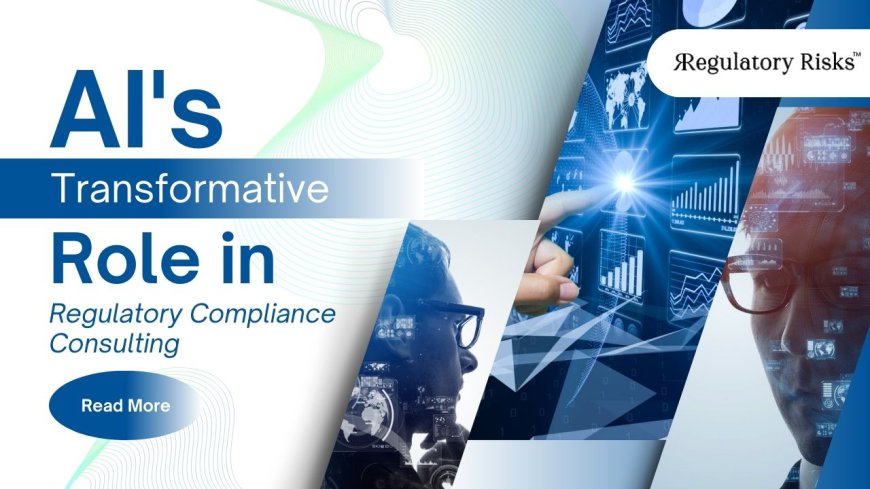AI's Transformative Role in Regulatory Compliance Consulting
Discover how AI is transforming regulatory compliance consulting with real-time monitoring, adaptive frameworks, and enhanced efficiency for businesses worldwide.

In an era marked by rapid technological advancements and ever-evolving regulatory requirements, regulatory compliance consulting has become a vital service for businesses. From financial institutions to online gaming platforms, organizations face mounting pressures to stay compliant in a highly scrutinized global marketplace. The integration of Artificial Intelligence (AI) into compliance programs has emerged as a game-changer, offering unprecedented efficiency, accuracy, and adaptability.
This article explores how AI is revolutionizing compliance practices, its current applications, and the future of compliance departments. Whether you're in financial services, crypto, or gaming, understanding AI’s potential in regulatory compliance consulting is crucial for staying ahead.
The Growing Need for Regulatory Compliance Consulting
The global regulatory landscape has grown more complex over the past decade. Financial institutions, technology platforms, and crypto businesses now operate in jurisdictions with stringent compliance requirements, including anti-money laundering (AML), data privacy, and consumer protection laws.
Traditional compliance models, reliant on manual processes and static rules, struggle to keep up with the dynamic pace of regulatory changes. Businesses increasingly turn to regulatory compliance experts to design robust frameworks that ensure adherence to evolving regulations. Coupled with regulatory risk consulting, these frameworks help organizations mitigate risks while maintaining operational efficiency.
Why AI is Transforming Regulatory Compliance Consulting
AI’s ability to process vast amounts of data in real time makes it an ideal tool for compliance. It not only automates repetitive tasks but also enhances decision-making through predictive analytics and machine learning.
Key benefits of AI in Regulatory Compliance Consulting include:
- Enhanced Efficiency: AI accelerates data processing, reducing the time needed for tasks like transaction monitoring and report generation.
- Improved Accuracy: Intelligent algorithms identify patterns and anomalies with precision, minimizing human errors.
- Adaptability: Machine learning models evolve as they process new data, ensuring compliance systems stay relevant in changing regulatory landscapes.
Current Applications of AI in Compliance Programs
1. Real-Time Monitoring
AI-powered systems continuously scan data for suspicious activities, providing instant alerts. This is particularly crucial for industries like crypto and gaming, where high transaction volumes and rapid movements pose significant compliance risks.
2. Know Your Customer (KYC)
AI streamlines KYC processes by automating document verification and cross-referencing databases. For example, Optical Character Recognition (OCR) technology scans and validates IDs, drastically reducing onboarding times.
3. Anti-Money Laundering (AML)
AML compliance is a cornerstone of regulatory risk consulting. AI analyzes transaction patterns to detect and prevent money laundering schemes. Its predictive capabilities also anticipate illicit activities, enabling proactive measures.
4. Automated Reporting
Generating regulatory reports is often time-consuming. AI simplifies this process by compiling data from multiple sources and creating consistent, error-free reports, which can be customized for different jurisdictions.
Industries Benefiting from AI-Driven Compliance
AI is not limited to a single sector; its applications span industries:
- Financial Services: Banks and investment firms leverage AI for fraud detection and transaction monitoring.
- Crypto and Digital Assets: Exchanges and platforms use AI to meet stringent KYC and AML requirements.
- Gaming and Casinos: AI identifies fraudulent activities like bonus abuse and money laundering within gaming platforms.
- Technology Platforms: AI ensures compliance with data privacy laws such as GDPR and CCPA.
How AI Enhances Regulatory Risk Consulting
Regulatory risk consulting involves identifying potential compliance vulnerabilities and implementing measures to mitigate them. AI plays a pivotal role by offering:
- Predictive Analytics: AI forecasts risks based on historical data and emerging trends.
- Scenario Analysis: Simulations help companies understand the impact of regulatory changes.
- Regulatory Intelligence: AI tools monitor global regulatory updates and notify businesses of relevant changes.
Challenges in AI Integration for Compliance
Despite its advantages, integrating AI into compliance programs is not without challenges:
- Data Privacy Concerns: Using AI for compliance must align with data protection laws.
- Implementation Costs: Initial investments in AI technology can be high for smaller businesses.
- Skill Gaps: Organizations need trained personnel to manage and interpret AI outputs effectively.
Partnering with regulatory compliance experts can help overcome these hurdles, ensuring seamless AI adoption.
Future Trends in AI-Driven Compliance
AI’s role in compliance is set to expand, with several transformative trends on the horizon:
1. Adaptive Compliance Frameworks
AI will enable dynamic compliance systems that automatically update policies based on new regulations or case law.
2. Predictive Regulation
Regulators may adopt AI to monitor industries in real time, shifting the focus from reactive to proactive compliance.
3. AI-Driven Risk Scores
Companies could receive risk ratings based on real-time data, incentivizing transparent and compliant operations.
4. Virtual Compliance Officers
AI-powered agents could provide real-time guidance to teams, reducing workloads and improving decision-making.
Emerging Tools in Regulatory Compliance Consulting
The next wave of AI-driven tools promises to revolutionize compliance further:
- Blockchain Integration: AI and blockchain can create secure, immutable records for audits.
- Emotion Analysis: Advanced AI may detect fraud by analyzing speech patterns and communication cues.
- Cross-Jurisdiction Monitoring: Unified platforms will enable businesses to manage compliance across multiple regions seamlessly.
Why Businesses Need Regulatory Compliance Experts
While AI offers advanced solutions, the human element remains crucial. Regulatory compliance experts bridge the gap between technology and practical application, tailoring AI tools to meet specific industry needs. Their expertise ensures that compliance programs are both effective and scalable.
Conclusion
As AI continues to reshape regulatory compliance consulting, businesses must embrace this technology to stay competitive. From real-time monitoring to adaptive frameworks, AI empowers organizations to navigate complex regulations with confidence.
By combining cutting-edge AI solutions with guidance from regulatory compliance experts, businesses can future-proof their compliance strategies and thrive in a rapidly evolving regulatory landscape.
